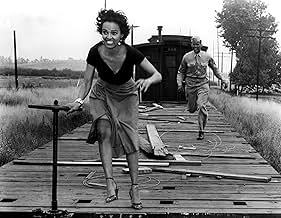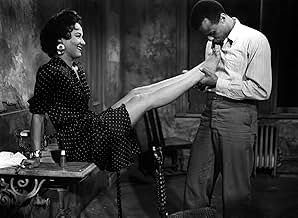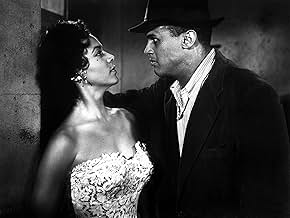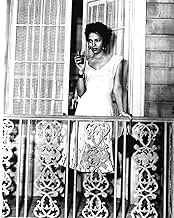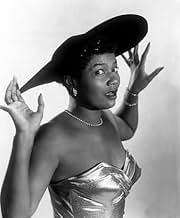Carmen Jones
- 1954
- Tous publics
- 1h 45m
IMDb RATING
6.8/10
6.2K
YOUR RATING
Contemporary version of the Bizet opera, with new lyrics and an African-American cast.Contemporary version of the Bizet opera, with new lyrics and an African-American cast.Contemporary version of the Bizet opera, with new lyrics and an African-American cast.
- Director
- Writers
- Stars
- Nominated for 2 Oscars
- 6 wins & 8 nominations total
Brock Peters
- Sergeant Brown
- (as Broc Peters)
LeVern Hutcherson
- Joe
- (voice)
- (as Le Vern Hutcherson)
Marilyn Horne
- Carmen Jones
- (voice)
- (as Marilynn Horne)
Marvin Hayes
- Husky Miller
- (voice)
Alvin Ailey
- Dance Soloist
- (uncredited)
DeForest Covan
- Trainer
- (uncredited)
Joseph E. Crawford
- Dink Franklin
- (singing voice)
- (uncredited)
Carmen De Lavallade
- Dance Soloist
- (uncredited)
Bernie Hamilton
- Reporter
- (uncredited)
Margaret Lancaster
- Singing Voice
- (uncredited)
- Director
- Writers
- All cast & crew
- Production, box office & more at IMDbPro
Featured reviews
Some greatness here. Dandridge's performance is riveting, and Pearl Bailey is a wonderful addition. Bizet's music is as appealing as always. The singers are excellent. The dancers at Billy Pastor's are another high point.
Too many slips for me to rate it a 10. It's lip-synced -- like every other movie musical, and (despite what one other reviewer said), one of the best lip-sync jobs I've seen. Only My Fair Lady does better (of those I've seen). Dandridge, Belafonte, and Bailey are particularly good; Olga James much less so. But I always find lip-syncing painfully obvious and distracting and will probably never have a chance to top-rate a movie musical as a result. It's also quite distracting when Joe breaks into song, because LeVern Hutcherson's voice is so different from Harry Belafonte's. It's a real shame that experienced singers like Dandridge and Belafonte weren't allowed to sing. Marilyn Horne, wow -- but I like the voice to match the face.
The acting is uneven. Some is excellent, led by Dandridge, and others do well too. But some of the acting is stiff.
Then there's the re-setting. Oh, moving the place is fine. It's funny that a couple of reviewers have referred to "how the Spaniards do it" and "Spanish opera". Hey, Carmen is set in Seville and Bizet attempted to use some Spanish musical idioms, but Carmen is a French opera through and through. Bizet was French, Prosper Merimee was French, the libretto is in French. But Carmen Jones only uses the top arias from Carmen, and ends up adding a lot of dialog to fill in the time. The story is true to the original, but Bizet told more in music and Hammerstein tells more in words. Oscar should have trusted Georges more.
I notice that Alvin Ailey is uncredited as a dancer. I found a couple of photos of him on the web -- it's hard, because his dance company has been so much more famous than the man, but I found a couple. I *think* I figured out which one he is -- some slo-mo work there -- but most of the dancers' faces don't come into focus for long enough to know for sure. It would be mostly a curiosity to know, since the movie doesn't show enough of the dance to see any personal style.
Too many slips for me to rate it a 10. It's lip-synced -- like every other movie musical, and (despite what one other reviewer said), one of the best lip-sync jobs I've seen. Only My Fair Lady does better (of those I've seen). Dandridge, Belafonte, and Bailey are particularly good; Olga James much less so. But I always find lip-syncing painfully obvious and distracting and will probably never have a chance to top-rate a movie musical as a result. It's also quite distracting when Joe breaks into song, because LeVern Hutcherson's voice is so different from Harry Belafonte's. It's a real shame that experienced singers like Dandridge and Belafonte weren't allowed to sing. Marilyn Horne, wow -- but I like the voice to match the face.
The acting is uneven. Some is excellent, led by Dandridge, and others do well too. But some of the acting is stiff.
Then there's the re-setting. Oh, moving the place is fine. It's funny that a couple of reviewers have referred to "how the Spaniards do it" and "Spanish opera". Hey, Carmen is set in Seville and Bizet attempted to use some Spanish musical idioms, but Carmen is a French opera through and through. Bizet was French, Prosper Merimee was French, the libretto is in French. But Carmen Jones only uses the top arias from Carmen, and ends up adding a lot of dialog to fill in the time. The story is true to the original, but Bizet told more in music and Hammerstein tells more in words. Oscar should have trusted Georges more.
I notice that Alvin Ailey is uncredited as a dancer. I found a couple of photos of him on the web -- it's hard, because his dance company has been so much more famous than the man, but I found a couple. I *think* I figured out which one he is -- some slo-mo work there -- but most of the dancers' faces don't come into focus for long enough to know for sure. It would be mostly a curiosity to know, since the movie doesn't show enough of the dance to see any personal style.
This is the story of a soldier, Joe (Harry Belafonte) and a fiery lady, Carmen (Dorothy Dandridge) and their unlikely relationship which begins with Joe trying to transport Carmen to the brig...and ends up with the pair falling in love.
If you are looking to see a classic opera translated into more modern times and with entirely new lyrics, then "Carmen Jones" is definitely for you. However, regardless of its all-black cast, this is clearly a film that is for very select folks! You hate opera well then the film will be a tough sell! As for me, I would have enjoyed the music OR the story. The total package didn't hold my interest. But this does NOT mean the film is bad or poorly made...it's not. It's all a matter of personal taste.
If you are looking to see a classic opera translated into more modern times and with entirely new lyrics, then "Carmen Jones" is definitely for you. However, regardless of its all-black cast, this is clearly a film that is for very select folks! You hate opera well then the film will be a tough sell! As for me, I would have enjoyed the music OR the story. The total package didn't hold my interest. But this does NOT mean the film is bad or poorly made...it's not. It's all a matter of personal taste.
You may guess that I love Bizet's opera Carmen, it is somewhat tragic but very passionate. While updated, this film directed wonderfully by the talented Otto Preminger is a wonderful contemporary version of the opera, still maintaining Bizet's wonderful music and inspired lyrics from Oscar Hammerstein II. Whether it is the definitive film version of the opera I am not sure, I absolutely adore the 1984 film with Placido Domingo and Julia Mignes-Johnson. That aside, this film is really handsomely shot, with beautiful crisp cinematography and stunning scenery. And of course the music is outstanding "Dat's Love", "Dis Flower", "Stan' Up an' Fight" and "Dere's a Cafe on de Corner" really do stand out. The story is a beautiful, tragic, compelling one, not at all confusing. And the performances are marvellous, Dorothy Dandridge is superb as Carmen Jones. She is gorgeous, flirtatious and sexy, everything Carmen in the opera should be. Harry Belafonte does a great job as Joe, the man consumed for the passion of Carmen, so much so he is driven to murder. Olga James is heart breaking as Cindy-Lou, Pearl Bailey is a delightful Frankie, Joe Adams is a great Husky Miller and Brock Peters is effective as Sergeant Brown. I have heard complaints that the singing was awful, and I disagree completely. Marilyn Horne has a beautiful singing voice and she did well as Carmen. She has been better though, she has a much stronger voice than what was heard here. And LeeVern Hutcherson has a lovely tenor voice, quite lightweight and sensitive when it needs to be. And Marvin Hayes has a very resonant voice that is needed for his character. If the singing was a little quiet at times, do bear in mind sound and technology wasn't as good then than it is now. My real complaint was that the lip-synching was a little behind the singing at times, but other than that, this is a great film. 9/10 Bethany Cox
Even after the success of Oklahoma, the partnership of Rodgers&Hammerstein was not cast in stone yet. After Oklahoma debuted, Oscar Hammerstein, II went to work on his next Broadway show with a dead collaborator. He wrote new lyrics for the music of Georges Bizet's opera Carmen and wrote a new book for an all black cast to perform it, in the tradition of Porgy and Bess.
That show was Carmen Jones and it ran for 502 performances on Broadway from 1943 to 1945. Hammerstein discovered what the team of Robert Wright and Chet Forrest had previously found out in adapting Edvard Grieg's melodies into their hit, Strange Music. That there's nothing like writing with a collaborator who can't complain and who's melodies are already a hit.
In fact while the show was originally on Broadway, Rise Stevens had sung in Going My Way the song that eventually became Dat's Love. And Nelson Eddy and sung The Toreador Song in his film Balalaika. Hammerstein brilliantly capitalized on some free publicity for his own show.
Harry Belafonte and Dorothy Dandridge give great acting performances though it's kind of strange to hear other voices coming from the mouths of two good singers. Their voices weren't operatic though, yet the singers dubbing them matched well with the personalities of both the leads. And Dandridge had Marilyn Horne, you can't do much better than that.
The whole thing originates from the French novelist's Prosper Merimee's story of the ill effects of passionate love. Harry Belefonte's on his way to being a Tuskegee airman and he runs afoul of Carmen Jones. Belefonte's got himself a gal, but Dandridge puts on her Delilah routine and Belefonte's dead meat.
In addition to Samson and Delilah the Belefonte character is remarkably similar to George Hurstwood in Theodore Dreiser's Sister Carrie. Another man who threw it all away for passion. I wouldn't be surprised if Dreiser refined Merimee's theme.
But Dandridge's performance is the best. As the hedonistic Carmen Jones, she's a wonder on screen. Seeing her realize that part on the screen, we can well understand why Belefonte threw it all away for love. Dandridge became the first black woman nominated in the Best Actress category, but she lost the Oscar sweepstakes to Grace Kelly for The Country Girl.
For those who like the opera Carmen, I think they'll be well pleased with Oscar Hammerstein, II did with Bizet's music and Merimee's story.
That show was Carmen Jones and it ran for 502 performances on Broadway from 1943 to 1945. Hammerstein discovered what the team of Robert Wright and Chet Forrest had previously found out in adapting Edvard Grieg's melodies into their hit, Strange Music. That there's nothing like writing with a collaborator who can't complain and who's melodies are already a hit.
In fact while the show was originally on Broadway, Rise Stevens had sung in Going My Way the song that eventually became Dat's Love. And Nelson Eddy and sung The Toreador Song in his film Balalaika. Hammerstein brilliantly capitalized on some free publicity for his own show.
Harry Belafonte and Dorothy Dandridge give great acting performances though it's kind of strange to hear other voices coming from the mouths of two good singers. Their voices weren't operatic though, yet the singers dubbing them matched well with the personalities of both the leads. And Dandridge had Marilyn Horne, you can't do much better than that.
The whole thing originates from the French novelist's Prosper Merimee's story of the ill effects of passionate love. Harry Belefonte's on his way to being a Tuskegee airman and he runs afoul of Carmen Jones. Belefonte's got himself a gal, but Dandridge puts on her Delilah routine and Belefonte's dead meat.
In addition to Samson and Delilah the Belefonte character is remarkably similar to George Hurstwood in Theodore Dreiser's Sister Carrie. Another man who threw it all away for passion. I wouldn't be surprised if Dreiser refined Merimee's theme.
But Dandridge's performance is the best. As the hedonistic Carmen Jones, she's a wonder on screen. Seeing her realize that part on the screen, we can well understand why Belefonte threw it all away for love. Dandridge became the first black woman nominated in the Best Actress category, but she lost the Oscar sweepstakes to Grace Kelly for The Country Girl.
For those who like the opera Carmen, I think they'll be well pleased with Oscar Hammerstein, II did with Bizet's music and Merimee's story.
Carmen (1954)
First of all, this is a gorgeous movie. The WWII-era sets, the fluid photography with a lot of long takes, the lighting and costumes and overall feel are elegant and un-compromised, first frame to last.
Second, the idea is fabulous, an all-Black cast and an African-American adaptation of the classic Carmen opera (by the French composure Bizet). The vernacular and the stereotypes might seem worn, or even insulting if you take them wrong (or just take them out of context) but in fact it's in line with that even better, earlier opera, Gershwin's Porgy and Bess. The stereotypes are ones that made sanitized sense equally to White and Black America just as other musicals made sanitized sense to the same audiences. If I sound like an apologist, I'm only responding to attacks on the film ("farcical" "gruesome" or "dreadful"), as being untrue or insensitive to Blacks, by saying that nearly all musicals are incredibly stylized and false, and nearly all movies of this era played with safe, simplified versions of life.
No, to be fair to this really interesting movie you need to treat it like you would your own favorite movies from the 1950s, accepting the limitations just as the movie makers did. It's got its own syntax and style, it's own inner set of rules.
And within those the performance of the character Carmen by Dorothy Dandridge is incredible. She's on fire, introspective, nuanced, and outrageous. The cast around her is excellent but inevitably uneven, and she stands easily above them in pure performance energy, even over the other big star, Harry Belafonte.
All of this said, the beautiful, finely made, early widescreen movie here, "Carmen Jones," is lacking some kind of necessary intensity to work. I can't pin down why. From little strains of Bizet that perk it up (like a boxing worker whistling the most famous theme as he works) to the truly perfect photography and editing (maybe too perfect?), the movie has a steady, compelling flow. It's based on a Broadway musical from 1943 (the year the movie is set, as well), and it has the bones of a great drama, if a familiar one (it's still Bizet).
What might be the biggest problem is the understandable decision to film it in a realistic way, with song (and minimal dance) numbers inserted relatively seamlessly along the way. This is the standard musical approach from from the early Astaire-Rogers films to the relatively contemporaneous Arthur Freed productions of the early 1950s like "Singin' in the Rain." But Carmen, the opera and stage musical, is not a lighthearted romantic comedy. It isn't just escapist entertainment. And the gravitas and drama in it, at the end in particular, doesn't quite work the way it does on the opera stage. You watch Belafonte and Dandridge acting their hearts out, but it has that perfect 1950s movie-making production to remind us that it's a movie, and we are detached in a far different way than watching a stage version, with real people and false settings.
But never mind all that--you'll see for yourself how absorbed you get and why not more so.
A couple last things. First, the singing voices of the two leads are dubbed (yes!), surprising in Belafonte's case in particular because he was (and is) an accomplished singer. Second, Dandridge and director Preminger were having a longterm affair during the filming and after, and she pulls off what might be the best performance of her life here. Third, the movie was shown to the head of the NAACP before release to check on any problems that might be seen from an African-American point of view (this is 1954, remember) and no objections were raised. By this point, Preminger had been working with an all Black cast and was in close quarters with the leading lady so he must have had some sense that what he was after was on target for the time.
Watch it if you have interest in any of these things--WWII civilian life, Dandridge or Belafonte, opera adaptations into movies, early big budget African-American movies, Preminger movies, or terrific early Cinemascope photography. That should cover a lot of viewers, but not all. For me, I liked it a lot, and liked parts of it enormously (like the short clip of Max Roach drumming away on a barroom stage). But I felt slightly restless too often to get totally absorbed. One last suggestion--see it on the biggest screen you can, so it will be immersive.
First of all, this is a gorgeous movie. The WWII-era sets, the fluid photography with a lot of long takes, the lighting and costumes and overall feel are elegant and un-compromised, first frame to last.
Second, the idea is fabulous, an all-Black cast and an African-American adaptation of the classic Carmen opera (by the French composure Bizet). The vernacular and the stereotypes might seem worn, or even insulting if you take them wrong (or just take them out of context) but in fact it's in line with that even better, earlier opera, Gershwin's Porgy and Bess. The stereotypes are ones that made sanitized sense equally to White and Black America just as other musicals made sanitized sense to the same audiences. If I sound like an apologist, I'm only responding to attacks on the film ("farcical" "gruesome" or "dreadful"), as being untrue or insensitive to Blacks, by saying that nearly all musicals are incredibly stylized and false, and nearly all movies of this era played with safe, simplified versions of life.
No, to be fair to this really interesting movie you need to treat it like you would your own favorite movies from the 1950s, accepting the limitations just as the movie makers did. It's got its own syntax and style, it's own inner set of rules.
And within those the performance of the character Carmen by Dorothy Dandridge is incredible. She's on fire, introspective, nuanced, and outrageous. The cast around her is excellent but inevitably uneven, and she stands easily above them in pure performance energy, even over the other big star, Harry Belafonte.
All of this said, the beautiful, finely made, early widescreen movie here, "Carmen Jones," is lacking some kind of necessary intensity to work. I can't pin down why. From little strains of Bizet that perk it up (like a boxing worker whistling the most famous theme as he works) to the truly perfect photography and editing (maybe too perfect?), the movie has a steady, compelling flow. It's based on a Broadway musical from 1943 (the year the movie is set, as well), and it has the bones of a great drama, if a familiar one (it's still Bizet).
What might be the biggest problem is the understandable decision to film it in a realistic way, with song (and minimal dance) numbers inserted relatively seamlessly along the way. This is the standard musical approach from from the early Astaire-Rogers films to the relatively contemporaneous Arthur Freed productions of the early 1950s like "Singin' in the Rain." But Carmen, the opera and stage musical, is not a lighthearted romantic comedy. It isn't just escapist entertainment. And the gravitas and drama in it, at the end in particular, doesn't quite work the way it does on the opera stage. You watch Belafonte and Dandridge acting their hearts out, but it has that perfect 1950s movie-making production to remind us that it's a movie, and we are detached in a far different way than watching a stage version, with real people and false settings.
But never mind all that--you'll see for yourself how absorbed you get and why not more so.
A couple last things. First, the singing voices of the two leads are dubbed (yes!), surprising in Belafonte's case in particular because he was (and is) an accomplished singer. Second, Dandridge and director Preminger were having a longterm affair during the filming and after, and she pulls off what might be the best performance of her life here. Third, the movie was shown to the head of the NAACP before release to check on any problems that might be seen from an African-American point of view (this is 1954, remember) and no objections were raised. By this point, Preminger had been working with an all Black cast and was in close quarters with the leading lady so he must have had some sense that what he was after was on target for the time.
Watch it if you have interest in any of these things--WWII civilian life, Dandridge or Belafonte, opera adaptations into movies, early big budget African-American movies, Preminger movies, or terrific early Cinemascope photography. That should cover a lot of viewers, but not all. For me, I liked it a lot, and liked parts of it enormously (like the short clip of Max Roach drumming away on a barroom stage). But I felt slightly restless too often to get totally absorbed. One last suggestion--see it on the biggest screen you can, so it will be immersive.
Did you know
- TriviaEartha Kitt was offered the role of Carmen, but the studio wanted her singing voice to be dubbed, so that her character would have an operatic voice. The same offer was made to Harry Belafonte and Diahann Carroll who accepted, but Kitt refused, wanting to use her natural voice. Dubbing was not required for Pearl Bailey, whose own voice suited her comedic songs.
- GoofsThe story takes place circa 1944, but all of the women's fashions and hairstyles are strictly 1954; when Carmen and Frankie are talking outside the Chicago Pawn Shop, 1950s-era automobiles passing by can clearly be seen reflected in the showcase window.
- Quotes
Carmen Jones: I always did want to see the big town.
Frankie: You got your wish, honey. Somethin' tells me Chicago's gonna be real good for you.
Myrt: Somethin' tells me you gonna be real *bad* for Chicago.
- Crazy creditsThe opening credits and end title are set around a flaming rose.
- ConnectionsFeatured in Small Steps, Big Strides: The Black Experience in Hollywood (1998)
- How long is Carmen Jones?Powered by Alexa
Details
- Release date
- Country of origin
- Language
- Also known as
- Oscar Hammerstein's Carmen Jones
- Filming locations
- Southern Pacific railroad crossing at 8746 E Los Angeles Avenue, aka California Highway 118, Moorpark, California, USA(scene where Carmen attempts escape from the Jeep)
- Production company
- See more company credits at IMDbPro
Box office
- Budget
- $750,000 (estimated)
- Runtime1 hour 45 minutes
- Color
- Aspect ratio
- 2.55 : 1
Contribute to this page
Suggest an edit or add missing content




